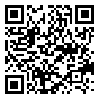دوره 30، شماره 2 - ( بهار 1401 )
جلد 30 شماره 2 صفحات 141-134 |
برگشت به فهرست نسخه ها
Download citation:
BibTeX | RIS | EndNote | Medlars | ProCite | Reference Manager | RefWorks
Send citation to:



BibTeX | RIS | EndNote | Medlars | ProCite | Reference Manager | RefWorks
Send citation to:
Sadeghian A, Fallah R, Zirak M. The Effect of Patient Education through Social Media on the COVID-19-Related Anxiety in Patients with Diabetes: A Single-Blind Clinical Trial. Avicenna J Nurs Midwifery Care 2022; 30 (2) :134-141
URL: http://nmj.umsha.ac.ir/article-1-2410-fa.html
URL: http://nmj.umsha.ac.ir/article-1-2410-fa.html
صادقیان علی، فلاح رمضان، زیرک محمد. بررسی تأثیر آموزش به بیمار از طریق شبکۀ اجتماعی بر میزان اضطراب مرتبط با کووید ـ 19 در بیماران مبتلا به دیابت: یک کارآزمایی بالینی تکسوکور. مجله مراقبت پرستاری و مامایی ابنسینا. 1401; 30 (2) :134-141
علی صادقیان1 

 ، رمضان فلاح2
، رمضان فلاح2 
 ، محمد زیرک*
، محمد زیرک* 

 3
3


 ، رمضان فلاح2
، رمضان فلاح2 
 ، محمد زیرک*
، محمد زیرک* 

 3
3
1- گروه پرستاری داخلی-جراحی، دانشکده پرستاری و مامایی، دانشگاه علوم پزشکی زنجان، زنجان، ایران
2- گروه آمار زیستی، دانشکده پزشکی، دانشگاه علوم پزشکی زنجان، زنجان، ایران
3- گروه پرستاری، دانشگاه علوم پزشکی مراغه، مراغه، ایران ، mohammadzirak@gmail.com
2- گروه آمار زیستی، دانشکده پزشکی، دانشگاه علوم پزشکی زنجان، زنجان، ایران
3- گروه پرستاری، دانشگاه علوم پزشکی مراغه، مراغه، ایران ، mohammadzirak@gmail.com
متن کامل [PDF 1294 kb]
(696 دریافت)
| چکیده (HTML) (1715 مشاهده)
چکیده گسترده انگلیسی: (626 مشاهده)
Background and Objective
The risk of Covid-19 infection is pathologically significant in patients with diabetes among other underlying diseases. Patients with diabetes are at risk for psychological trauma due to the Covid-19 anxiety. Accurate information and training help patients prevent and manage the Covid-19 infection which reduces anxiety and improves their quality of life. Many patients currently use social media such as chat groups for information, education, and medical support. The present study aimed to determine the effect of training through social media on the level of anxiety associated with Covid-19 in patients with diabetes due to the importance of controlling anxiety in patients with underlying diseases such as diabetes and the inadequacy of studies in this field.
Materials and Methods
The present study is a single-blind randomized clinical trial with a pretest-posttest design. A total of 113 participants were selected from patients with diabetes referred to educational and medical centers in Zanjan, Iran in 2021. Inclusion criteria included: 1) patients aged 18 to 60 years, 2) definitive diagnosis of diabetes, 3) being literate, 4) no mental illness, and 3) ability to work with a smartphone, tablet, or laptop. The exclusion criteria were the unwillingness of the person to continue cooperation and infection with Covid-19. Data collection was performed using demographic survey questions and the Coronavirus Anxiety Scale (CAS). The intervention group was trained through WhatsApp and Telegram messengers for two weeks after completing the questionnaires. CAS was completed by both groups to remeasure the level of anxiety in the patients at the end of the training sessions and immediately after the intervention. SPSS software (version 26.0) was used for data analysis. A P-value less than 0.05 was considered statistically significant.
Results
Based on the results, no statistically significant difference was observed in the mean scores of anxiety between the intervention and control groups before the intervention (P= .066) and after that (P= .493). However, the results of paired t-test indicated a statistically significant difference between the scores of anxiety before and after the intervention in the intervention group (P <.001).
Conclusion
Based on the results of the present study on Covid-19 anxiety, training through social media was effective in reducing the level of anxiety in the intervention group; however, it failed to significantly decrease the mean anxiety score of the intervention group compared to that of the control group. In this regard, Azadi et al. (2019) found that social network-based mindfulness intervention can be used as an effective treatment for psychological symptoms such as depression, anxiety, and stress in patients with diabetes who fail to attend regular group sessions of psychological therapy. Hayek et al. (2013) in a study on the effect of a training program on the level of anxiety, depression, blood sugar, self-care, and adherence to treatment in patients with type 2 diabetes indicated that a significant difference was observed in the scores of anxiety and depression in the intervention and control groups after the intervention. Therefore, they concluded that implementing educational interventions for these patients can reduce their level of anxiety and depression, as well as improve their level of self-care, blood sugar, and adherence to the treatment. The difference in the results of the above-mentioned studies and the present one can be due to the way of providing training, the study population, and the time of conducting the study. The results of the present study revealed that participants who received training on Covid-19 through social media had lower levels of anxiety compared to that before the intervention; however, the reduction was not significant in intergroup comparison.
نوع مطالعه: پژوهشي اصیل |
موضوع مقاله:
پرستاری
دریافت: 1400/8/19 | پذیرش: 1400/12/2 | انتشار: 1401/3/10
دریافت: 1400/8/19 | پذیرش: 1400/12/2 | انتشار: 1401/3/10
ارسال پیام به نویسنده مسئول
| بازنشر اطلاعات | |
 |
این مقاله تحت شرایط Creative Commons Attribution-NonCommercial 4.0 International License قابل بازنشر است. |




 gmail.com
gmail.com